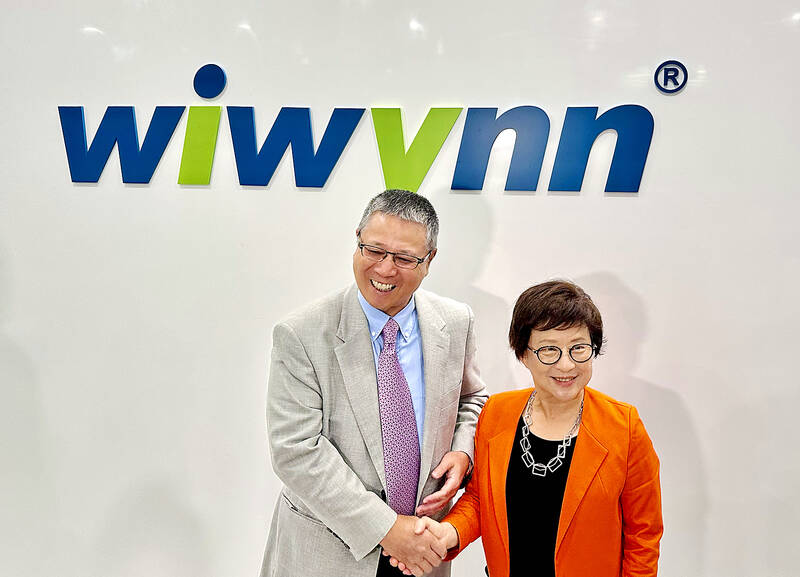Wiwynn Corp (緯穎), a developer and manufacturer of artificial intelligence (AI) servers, yesterday saw its stock price rally to the highest level in a month after last month reporting its fastest annual revenue growth in more than a year.
Its share price surged by 2.3 percent and closed at NT$2,450 yesterday, the highest level since April 9. Wiwynn narrowed its lag behind Alchip Technologies Ltd (世芯), the most expensive stock trading on the Taiwan Stock Exchange. Shares of Alchip, an AI chip designer, tumbled by 5.23 percent to NT$2,625 yesterday.
Wiwynn reported 20.79 percent annual growth in revenue for last month, totaling NT$21.96 billion (US$676.52 million), compared with NT$18.18 billion in April last year, a company filing with the Taiwan Stock Exchange showed. That represented the fastest annual expansion since March last year.

Photo: Fang Wei-chieh, Taipei Times
For first four months of this year, revenue edged down 0.88 percent to NT$91.59 billion from NT$92.41 billion, the filing showed.
The company’s net profit grew 42.7 percent annually last quarter to NT$4.71 billion. The quarterly earnings set an all-time high and exceeded analysts’ estimates of NT$3.51 billion.
That represented quarterly growth of 33.9 percent from NT$3.52 billion.
Earnings per share were NT$26.92 last quarter, up from NT$18.86 a year earlier and NT$20.1 a quarter earlier.
Gross margin came in at a record high of 11.1 percent, compared with 8.3 percent a year earlier and 11 percent the previous quarter, thanks to revenue contributions from new products, the company said on Tuesday.
Operating margin also climbed to a record high of 8.4 percent last quarter from 6 percent in the same period last year and 7.6 percent in the fourth quarter last year.
Wiwynn said it was optimistic about long-term demand growth in the cloud-based industry and AI servers, and is committed to continue its investments in data center technologies and product development.
It expects AI servers to make up a bigger portion of its total server shipments this year, given an upbeat customer growth forecast, Wiwynn said three months ago. AI servers accounted for 20 percent of the company’s total server shipments in the fourth quarter of last year.
Wiwynn also expects to ship AI servers equipped with graphics processing units from the second half of this year. A majority of AI servers it ships are equipped with application-specific integrated circuits.
To cope with growing demand, the company has made progress in expanding capacity globally.
Its third factory in Mexico had entered mass production last year, as scheduled, the company said on Tuesday. Servers for customers based in North America, Wiwynn’s biggest revenue source, were assembled at the Mexican factory.
Wiwynn is also building a second factory in Malaysia to ramp up production in the second half of this year.
At home, the company is adding a new factory in Tainan, which is set to be a new product development site and a major testing hub.

SELL-OFF: Investors expect tariff-driven volatility as the local boarse reopens today, while analysts say government support and solid fundamentals would steady sentiment Local investors are bracing for a sharp market downturn today as the nation’s financial markets resume trading following a two-day closure for national holidays before the weekend, with sentiment rattled by US President Donald Trump’s sweeping tariff announcement. Trump’s unveiling of new “reciprocal tariffs” on Wednesday triggered a sell-off in global markets, with the FTSE Taiwan Index Futures — a benchmark for Taiwanese equities traded in Singapore — tumbling 9.2 percent over the past two sessions. Meanwhile, the American depositary receipts (ADRs) of Taiwan Semiconductor Manufacturing Co (TSMC, 台積電), the most heavily weighted stock on the TAIEX, plunged 13.8 percent in

A wave of stop-loss selling and panic selling hit Taiwan's stock market at its opening today, with the weighted index plunging 2,086 points — a drop of more than 9.7 percent — marking the largest intraday point and percentage loss on record. The index bottomed out at 19,212.02, while futures were locked limit-down, with more than 1,000 stocks hitting their daily drop limit. Three heavyweight stocks — Taiwan Semiconductor Manufacturing Co (TSMC, 台積電), Hon Hai Precision Industry Co (Foxconn, 鴻海精密) and MediaTek (聯發科) — hit their limit-down prices as soon as the market opened, falling to NT$848 (US$25.54), NT$138.5 and NT$1,295 respectively. TSMC's

TARIFFS: The global ‘panic atmosphere remains strong,’ and foreign investors have continued to sell their holdings since the start of the year, the Ministry of Finance said The government yesterday authorized the activation of its NT$500 billion (US$15.15 billion) National Stabilization Fund (NSF) to prop up the local stock market after two days of sharp falls in reaction to US President Donald Trump’s new import tariffs. The Ministry of Finance said in a statement after the market close that the steering committee of the fund had been given the go-ahead to intervene in the market to bolster Taiwanese shares in a time of crisis. The fund has been authorized to use its assets “to carry out market stabilization tasks as appropriate to maintain the stability of Taiwan’s

STEEP DECLINE: Yesterday’s drop was the third-steepest in its history, the steepest being Monday’s drop in the wake of the tariff announcement on Wednesday last week Taiwanese stocks continued their heavy sell-off yesterday, as concerns over US tariffs and unwinding of leveraged bets weighed on the market. The benchmark TAIEX plunged 1,068.19 points, or 5.79 percent, to 17,391.76, notching the biggest drop among Asian peers as it hit a 15-month low. The decline came even after the government on late Tuesday authorized the NT$500 billion (US$15.2 billion) National Stabilization Fund (國安基金) to step in to buoy the market amid investors’ worries over tariffs imposed by US President Donald Trump. Yesterday’s decline was the third-steepest in its history, trailing only the declines of 2,065.87 points on Monday and